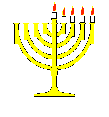|
Chanukah Guide
Quick Guide
This year, 2009, (or if you want to be exact 5770) we begin to light the Chanukah candles on
Friday evening, December 11, 2009.
What time should we light
up?
The normal time for lighting the Chanukah candles is right after it gets dark, however, since the first night is Friday see the next section for lighting when it is Chanukah and Shabbat.
Candles lit in the day are not
noticeable. Many families wait until all of the family members have assembled
and then light the candles.
What Am I Supposed to do for the Shabbat?
On Friday, light it before it gets
dark. The Chanukah candles should be lit immediately before the Shabbat candles, and if not, close to the Shabbat candle light time. They should burn for at least a half hour after it is dark outside.
When Shabbat ends, the candles are lit after the Havdalah ceremony which concludes the Shabbat.
Where should the candles
be lit?
The place for lighting is based on
the principle of spreading the light. Meaning that we spread the
light of the miracle of Chanukah to others by putting the menorah in one
of three places:
| Window |
Put your menorah in the window so that others in the street may see it. But if you live on
a high floor of a building, it is better to place the menorah on the dining room table.
|
| Table |
Put your menorah on the table so that you and your family may see it.
|
| Door |
Put your menorah outside by your door opposite the mezzuah so that others may see it as they walk by.
|
How are the candles lit?
The first night, the first candle
is lit. It is the candle on the extreme right of the menorah.
On the second night, the second candle (the new one) is lit first
and then the one which was lit the previous night is lit. The
same is true for the successive nights, the new candle is given
preference over the candles that have been lit, just like you
should give preference to a new guest who is visiting you over
a guest who has been by you many times before.
|
 |

|
 |

|
| First Night
| Second Night
| Third Night
| Fourth Night
|
What is the Shamash?
The shamash is the candle which is
used to light the other candles. It is not one of the Chanuka
candles, yet it is not blown out but set in a place elevated above
the Chanuka candles. The light of this candle may be used for
lighting other candles, whereas the flame of the other candles
may not be used for lighting other Chanuka candles. Simliar to
the principle of he who serves is elevated.
Who should light the candles?
It was traditional for the head
of the house to light the candles. In recent times, many young
boys have started to light their own menorahs. (Keep an eye out
for FIRE HAZARDS !) Although women and girls generally let the
men do the lighting, if no man is available to light, then the women should do
the lighting. Women generally light the Shabbat candles, men generally
light the Chanuka candles.
What are the Blessings?
Before you light the candles, make the appropriate blessings. If you don't know them click here to get them.
What if the candle goes out?
The Chanuka candle is supposed to
burn for at least a half hour. If it went out before the half
hour has past, relight it. If the half hour has elapsed, then
it's dependent on you if you want to light it or not.
What is traditional to eat?
The most traditional foods are either latkes (potato pancakes) or
sufganiot (jelly filled donuts). In Israel, the sufganiot are very
popular, but in the Diaspora the latkes remain a staple tradition. For
recipes click here.
In addition, milk dishes are popular as part of the miracle came from eating
cheese as related above.
~~~~~~~
from the December 2009 Edition of the Jewish Magazine
|










